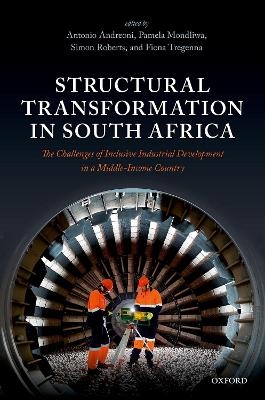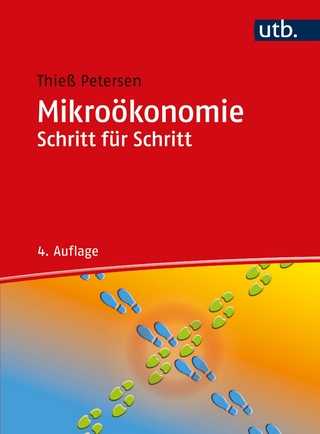
Structural Transformation in South Africa
Oxford University Press (Verlag)
978-0-19-289431-1 (ISBN)
Taking South Africa as an important case study of the challenges of structural transformation, Structural Transformation in South Africa offers a new micro-meso level framework and evidence linking country-specific and global dynamics of change, with a focus on the current challenges and opportunities faced by middle-income countries. Detailed analyses of industry groupings and interests in South Africa reveal the complex set of interlocking country-specific factors which have hampered structural transformation over several decades, but also the emerging productive areas and opportunities for structural change. The structural transformation trajectory of South Africa presents a unique country case, given its industrial structure, concentration and highly internationalized economy, as well as the objective of black economic empowerment.
Structural Transformation in South Africa links these micro-meso dynamics to global forces driving economic, institutional and social change. This include digital industrialization, global value chain consolidation, financialization, environmental and other sustainability challenges, which are reshaping structural transformation dynamics across middle-income countries like South Africa. While these new drivers of change are disrupting existing industries and interests in some areas, in others they are reinforcing existing trends and configurations of power. The book analyses the ways in which both the domestic and global drivers of structural transformation shape-and, in some cases, are shaped by-a country's political settlement and its evolution. By focusing on the political economy of structural transformation, the book disentangles the specific dynamics underlying the South African experience of the middle-income country conundrum. In so doing, it brings to light the broader challenges faced by similar countries in achieving structural transformation via industrial policies.
Antonio Andreoni is Associate Professor of Industrial Economics at University College London and Head of Research at the UCL Institute for Innovation and Public Purpose. He is Visiting Associate Professor in the Fourth Industrial Revolution, SARChI Industrial Development, University of Johannesburg. Antonio has researched and published extensively on production, technological change, and innovation dynamics; structural change, global value chains and industrial development; financialisation and corruption; governance and political economy of industrial policy. Antonio is an Editor of The European Journal of Development Research. He consults to various international organisations such as UNIDO, UNCTAD, UNDP, ILO, World Bank and OECD. Pamela Mondliwa is a Senior Managing Consultant at Berkeley Research Group (BRG) and a Research Associate at the Centre for Competition, Regulation and Economic Development (CCRED), University of Johannesburg. She has worked across consulting, academia, and policy on issues related to competition, economic regulation, industrial development, and regional economic development. Pamela has provided research support to various government departments in South Africa as well as international organisations. She advises competition authorities and private clients on competition and economic regulation cases. Prior to joining BRG, she was a Senior Researcher at CCRED and an Economist at the Competition Commission of South Africa. Simon Roberts is a Professor of Economics at the University of Johannesburg, where he founded the Centre for Competition, Regulation and Economic Development (CCRED), and a visiting Professor at the UCL Institute for Innovation and Public Purpose. He has worked extensively on issues of industrial development, trade, regional and global value chains, competition, and economic regulation in Southern and East Africa, advising governments, competition authorities and regulators. He was an Economics Director at the UK Competition and Markets Authority (2019 to 2020) and Chief Economist at the Competition Commission of South Africa from 2006 to 2012. Fiona Tregenna holds the DSI/NRF South African Research Chair (SARChI) in Industrial Development and is a Professor of Economics at the University of Johannesburg. She has a Ph.D. in Economics from the University of Cambridge. Fiona is a part-time Member of the Competition Tribunal where she adjudicates competition (anti-trust) cases, and serves on a number of boards, advisory panels and councils, including the Presidential Economic Advisory Council. She consults to various research institutes and international organisations such as UNIDO, UNCTAD and the ILO. Her primary research interest is in issues of structural change, deindustrialization, and industrial development.
1: Antonio Andreoni, Pamela Mondliwa, Simon Roberts, and Fiona Tregenna: Framing structural transformation in South Africa and beyond
2: Nimrod Zalk: Structural change in South Africa: a sectoral historical perspective
3: Antonio Andreoni, Lauralyn Kaziboni, and Simon Roberts: Metals, machinery, and mining equipment industries in South Africa: the relationship between power, governance, and technological capabilities
4: Jason Bell, Lorenza Monaco, and Pamela Mondliwa: Leveraging linkages for developing plastic products: an assessment of backward input linkages from polymers and forward output linkages to the automotive industry
5: Justin Barnes, Anthony Black, and Lorenza Monaco: Government policy in multinational-dominated global value chains: structural transformation within the South African automotive industry
6: Christopher Cramer and Shingie Chisoro-Dube: The industrialization of freshness and structural transformation in South African fruit exports
7: Stefano Ponte: Sustainability and green capital accumulation: lessons from the South African wine value chain
8: Sumayya Goga and Pamela Mondliwa: Structural transformation, economic power, and inequality in South Africa
9: Thando Vilakazi and Teboho Bosiu: Black economic empowerment, barriers to entry, and economic transformation in South Africa
10: Antonio Andreoni, Nishal Robb, and Sophie van Huellen: Profitability without investment: how financialization undermines structural transformation in South Africa
11: Antonio Andreoni and Fiona Tregenna: The middle-income trap and premature deindustrialization in South Africa
12: Antonio Andreoni, Justin Barnes, Anthony Black, and Timothy Sturgeon: Digitalization, industrialization, and skills development: opportunities and challenges for middle-income countries
13: Antonio Andreoni, Keun Lee, and Sofia Torreggiani: Global value chains, 'in-out-in' industrialization, and the global patterns of sectoral value addition
14: Pamela Mondliwa and Simon Roberts: The political economy of structural transformation: political settlements and industrial policy in South Africa
15: Antonio Andreoni, Pamela Mondliwa, Simon Roberts, and Fiona Tregenna: Towards a new industrial policy for structural transformation
| Erscheinungsdatum | 26.10.2021 |
|---|---|
| Verlagsort | Oxford |
| Sprache | englisch |
| Maße | 164 x 240 mm |
| Gewicht | 766 g |
| Themenwelt | Wirtschaft ► Volkswirtschaftslehre ► Mikroökonomie |
| ISBN-10 | 0-19-289431-5 / 0192894315 |
| ISBN-13 | 978-0-19-289431-1 / 9780192894311 |
| Zustand | Neuware |
| Haben Sie eine Frage zum Produkt? |
aus dem Bereich


